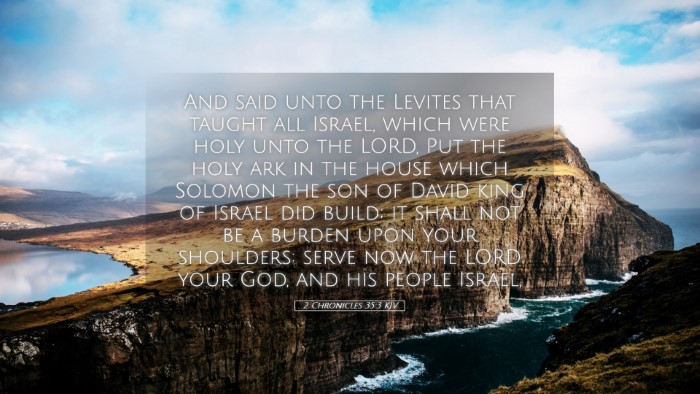Commentary on 2 Chronicles 35:3
In this verse, we find King Josiah taking significant action to restore proper worship among the people of Judah.
It reflects his commitment to the covenant and the proper observance of Passover, which is crucial for understanding
the relationship between Israel and God.
Context of 2 Chronicles 35
2 Chronicles provides a historical account of the reigns of various kings in Judah, focusing on their faithfulness
or rebellion against God. King Josiah stands out for his reforms that aimed to bring the nation back to the worship of Yahweh.
Interpretative Insights
In 2 Chronicles 35:3, we read: "And he said to the Levites who taught all Israel, and who were holy to the Lord,
'Put the holy ark in the house which Solomon the son of David, king of Israel, built; it shall no longer be a burden
on your shoulders. Now serve the Lord your God and His people Israel.' This verse highlights several critical themes:
-
Restoration of Worship:
Josiah's actions underscore the importance of genuine worship and the return to the sacred practices originally
set forth in the Law. His leadership not only rekindled spiritual fervor among the people but also reinstated
the significance of the Passover as a vital part of Israel's identity.
-
Role of the Levites:
The Levites played a vital role in the spiritual life of Israel, serving as teachers and stewards of the
sacred spaces. Josiah's directive to them emphasizes their responsibility to guide the people in true worship
and maintain the sanctity of the temple.
-
The Ark of the Covenant:
By instructing to place the Ark in its proper location within the newly restored temple, Josiah was reaffirming
God's presence among His people, reflecting a desire to prioritize divine fellowship and favor.
Commentary Excerpts
Matthew Henry's Commentary
Matthew Henry emphasizes the dedication of Josiah's heart toward the Lord. He notes that the act of placing the
Ark of the Covenant in the temple symbolizes returning to the fundamentals of worship. Henry highlights that
restoring the Ark reflects a desire not just for outward ritual but for inward piety and obedience to God.
Albert Barnes' Notes
Albert Barnes points out the implications of Josiah’s command as an act of leadership that sought to engage God’s
people in authentic worship once again. He explains that the phrase "put the holy ark" is indicative of returning
responsibility and reverence to the sacred object that represented God’s covenant with Israel. Barnes further
elaborates that Josiah sought to alleviate the burden from the Levites—a representation of restoring their rightful
place in ministry and service to God.
Adam Clarke's Commentary
Adam Clarke delves into the historical context of Josiah's reforms and emphasizes the passionate reformer’s heart.
He notes that the placing of the Ark signifies correction of practices that had grown stagnant or fallen into neglect.
Clarke also discusses the importance of the Passover observance, tying it back to God’s redemptive plan and the
pivotal role it plays in Israel's collective memory and identity.
Theological Implications
This verse beckons deeper theological reflection on God’s call for His people to maintain a covenant relationship
characterized by faithfulness and purity in worship. It underscores the necessity of leadership that fosters
communal spiritual revival. As seen in Josiah’s reign, such renewal often demands returning to established truths
and practices, emphasizing a communal responsibility.
Applications for Contemporary Believers
For modern readers and practitioners, this passage serves as a reminder of the ongoing need for reformation in the
church today. The call for leaders to prioritize authentic worship, teaching, and adherence to Biblical principles
remains vital. Ongoing engagement with God through history as expressed in Israel's traditions can inspire
contemporary worship practices that honor God and nurture spiritual growth.


